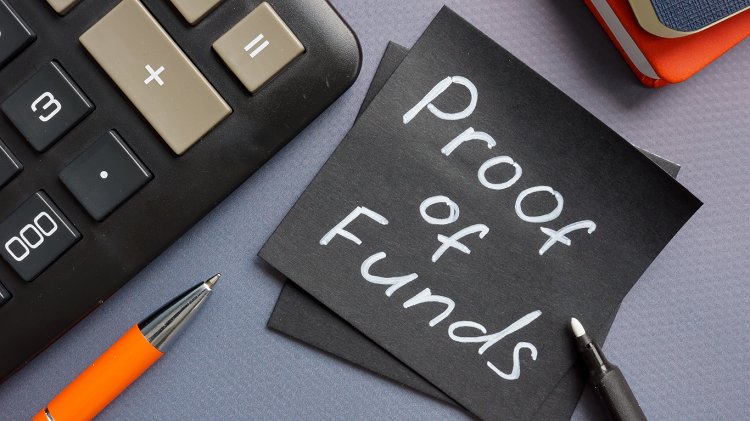If you’re thinking about buying a home, or you’ve just made an offer, you might already have come across the phrase “proof of funds.” It gets thrown around quite a bit in property transactions, and understandably, it raises questions. Mainly, people want to know: when exactly will the solicitor ask for it, and what do you need to provide?
It might seem like something that can wait until later, but actually, this step comes up much earlier than most people expect.
What actually counts as proof of funds?
At its core, it’s simply evidence that you have the money to go ahead with the purchase. That might be a combination of savings, the proceeds from another house sale, a gifted deposit from family, or even funds from investments. If you’re taking out a mortgage, it’s usually your deposit that gets looked at most closely.
For cash buyers, the full purchase price needs to be accounted for.
What counts as “proof” can vary slightly, but generally speaking, solicitors will want:
- Recent bank statements showing the money.
- A letter confirming a mortgage offer (if relevant).
- A gift letter if someone is giving you the money.
- Supporting documents for things like inheritance, investments, or sale of assets.
The purpose isn’t just to check you’ve got the money. It’s to make sure the money came from a legal and traceable source.
So when do they check it?
Usually, it’s right after you instruct the solicitor. In most cases, that’s around the same time your offer on a property is accepted. At this stage, your solicitor opens your file, runs ID checks, and carries out some early anti-money laundering checks. Proof of funds falls under this umbrella.
It might feel a bit early, especially if you’re still waiting on contracts or haven’t had your mortgage confirmed yet. But this is the normal timing. It helps your solicitor flag any issues as soon as possible, rather than down the line when things are more time-sensitive.
Why is it so early in the process?
There are a few reasons. One of the biggest is the legal duty placed on solicitors to prevent fraud and money laundering. It’s not about mistrusting you, it’s simply a legal requirement.
They need to understand the full picture of where your funds are coming from, especially if they come from multiple places. Waiting until later would only cause delays if something needs to be clarified.
Also, if there’s a chain involved, every small delay affects the entire line of buyers and sellers. Making sure the financial side is solid from the start keeps things moving.
What exactly will your solicitor want to see?
Let’s say you’re buying with a mortgage and putting down a £50,000 deposit. You’ll likely be asked to provide:
- Bank or savings account statements going back at least three months.
- A letter from your mortgage lender showing the agreed amount.
- If any of the deposit is a gift, a signed letter from the person giving it, confirming that it’s not a loan and they don’t expect ownership of the property.
- Evidence for any large payments that show up suddenly in your account.
What happens if the money comes from overseas?
That’s fairly common, but it adds a few extra steps. Solicitors need to be extra cautious with international transfers, particularly if they’re coming from countries flagged as higher risk for money laundering.
In these cases, expect to provide extra paperwork. That could include a translated bank statement, a signed declaration from the sender, and sometimes proof of how the sender got the money themselves.
It sounds like a lot, but getting it sorted early makes everything less stressful later.
Can you just say no to providing documents?
Not really. You can refuse, but your solicitor won’t be able to proceed with the transaction. They’re legally required to do these checks, and if you can’t or won’t show proof, they’ll have to stop acting for you.
That might feel invasive, especially if you’re just using long-held savings. But it’s not personal. Every buyer goes through it, and it’s better to be upfront from the beginning.
Will it slow the process down?
It can, but only if you’re unprepared. If you’ve got all your documents together and your finances are straightforward, it shouldn’t cause any delays at all. But if your money is spread across five accounts, or you’re still waiting on a gift letter, or there are unexplained transactions, that’s when it can drag things out.
Some people get caught off guard by how thorough the process is. For instance, transferring money from one account to another in your own name is fine, but if it looks unusual on a statement, you might still be asked to explain it.
What’s the best way to prepare?
Start collecting your paperwork early. If someone’s gifting you money, ask for a letter in advance. If you’re planning to sell shares or move money between accounts, keep a clear record.
It helps to keep everything in one place either printed or in a folder on your computer. That way, when your solicitor asks, you’re not scrambling to find statements or calling your bank in a panic. It also helps to be honest with your solicitor. If something’s complicated or you’re not sure how to show proof, just tell them. They’ve seen just about every financial arrangement under the sun.



